人教版2019 英语必修三 Unit 3 Diverse Cultures 课文翻译
人教版(2019) 必修第三册 Unit 3 Diverse Cultures...课件
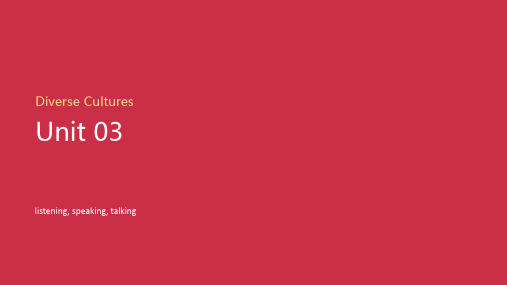
fortune cookie
幸运曲奇
B
gumbo
秋葵汤
C
nachos
墨西哥玉米片
A
2. Listen to the interview again and decide whether the statements are true [T] or false [F].
1. No food was ever invented in America.
1.Look at the photos of American food and match them with their names.Then guess which countries’ cuisine influenced the food’s invention.
A
B
C
D
hamburg er 汉堡包
Diverse Cultures
Unit 03
listening, speaking, talking
Part 1
01
Lead In
Where do you think this photo was taken? Do you find the place familiar? What can you see in the picture?
Steve: Right. And there are many more examples of mixed-culture dishes. Like nachos, for example. Interviewer: Oh, I just love nachos! Mexican corn chips covered in cheese! Steve: Yes, they're delicious, but they're not traditional Mexican food. The recipe was actually invented by a Mexican cook for his American customers. Then there are fortune cookies … Interviewer: What do you mean? Steve: They're not Chinese. Interviewer: You're kidding! But every Chinese restaurant in America has them!
Unit3 Diverse Cultures高中英语人教版(2019)必修第三册
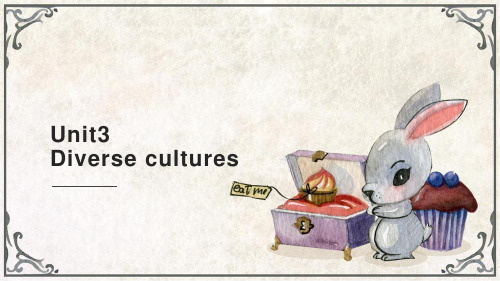
3. Why did Chinese immigrants go to San Francisco? (寻找发财、致富机会) ➢To seek their fortune in the gold rush.
4. What examples of ethnic/cultural diversity can you find in the(jo种ur族na多l?样性) ➢The Mission District: many of the people
➢The Richmond District: a jazz bar
3. Did Li Lan enjoy her trip in San Francisco? Can you find some evidence to support your ideas?
Paragraph 1
Main idea Li Lan's first impressiong of the city
Paragraph 4
Li Lan's visit to Chinatown
amazed, happy
➢so many good cafes ➢on beautiful china plates. ➢What great food!
Main idea
Feelings Examples
Paragraph 5 Li Lan's tomorow's visit to the Richmond District
4 .What are the benefits and challenges of cultural diversity? (Ex. 5.2, P29)
Challenges: Misunderstanding across languages and
Unit+3+Diverse+Cultures+单词讲解课件-人教版(2019)必修第三册+
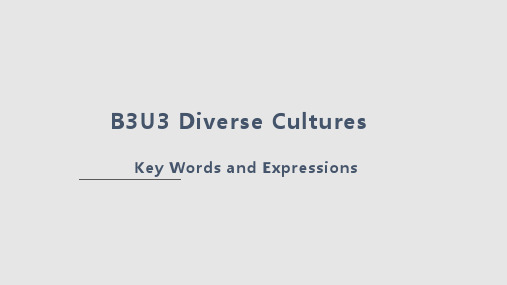
使某物适合于另一事物
• (2)suitable adj.
适合的;适宜的;相配的
• be suitable for sb./sth. 适合某人/某物
• be suitable to do sth. 适合做某事 • ① 他穿着最好的套装。He is dressed in his best suit.
• ②If you want to go by bus, that suits me.
①他虽然年轻,却在一家大公司挣得很多钱。 Young as he is, he earns a great deal of money in a big company.
②为了谋生,他开了商店。 In order to/In a bid to earn his living, he opened up shops.
5. head to (朝……)前进;(向……)去
•(1)head v.
(朝……)前进
•head for/towards
(朝……)前进;(向……)去
•head off
阻止;防止……发生/启程;出发
• ①翻译:疫情暴发后,许多医疗工作者毫不犹豫前往武汉进行救助。
• After the o_u_nedyic_a_l _w_o_r_k_e_r_s____ did not h_e_s_it_a_t_e_to _h_e_a_d__t_o_ Wuhan for help.
②由于缺乏资金,他们不得不结束正在建设的工程。
• They had to bring the project under construction to an end because of lacking money .
14. suit vt.适合;满足……需要;相配;合身 n.西服;套装
Unit+3+Diverse+Cultures+Video人教版(2019)高中英语必修第三册

Before you watch
Match each word or phrase with the correct definition. You may use a dictionary to help you.
1 global village 2 multiculturalism 3 resident 4 ethnicity 5 cherish 6 Hispanic 7 random 8 melting pot
Filling in the table according to the video.
People
What he/she says
Key words
Narrator What is Queens like?
population, residents, languages, cultures, nationalities, ethnicities
Complete the passage with the words in the box.
racial or ethnic group
foreign-born residents
a great example of a melting pot measure diversity
global village
Beginning
In today’s global village, multiculturalism is normal. But one neighborhood in particular claims to be one of the most diverse places in the world. Welcome to Queens, New York.
Unit3 Word and expressions 单词详解-高中英语(人教版2019)必修第三册
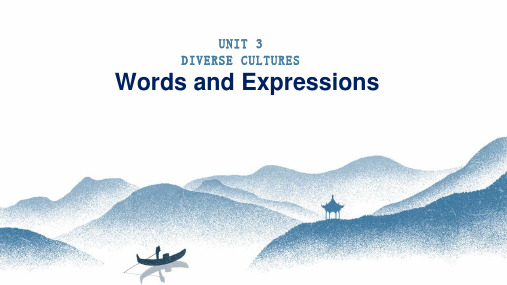
5). I’ ll never understand how it ___________ (发生) that you were late three times a week.
And what a city — a city that was able to rebuild itself after the
earthquake that occurred in 1906. 多么好的一座城市啊,一座在1906年地震后能够自我重建的城市
语法填空/微写作
1.It never _o_c_c_u_r_r_e_d__(occur) to me that you could succeed in
4) We are always seeking _t_o_i_m__p_r_o_v_e_ (improve) our working conditions.
完成句子
1) You should _s_e_e_k_a_d_v_i_c_e_ from your lawyer on this matter. 你应该征求你的律师对这件事的意见。
妈妈突然想起她把帐篷落在我们前一天晚上住的旅馆里了。 →___I_t _o_cc_u_r_r_e_d_t_o_M__o_th_e_r__th_a_t__she had left the tent in the hotel where we stayed the night before.(occur) →__I_t_s_tr_u_c_k__M_o_t_h_e_r_th_a_t___she had left the tent in the hotel where we stayed the night before.(strike) →__I_t_h_i_t _M__o_th_e_r_t_h_a_t _she had left the tent in the hotel where we
高一英语人教版(2019)必修第三册Unit 3 Diverse Cultures课件

高中英语 必修第三册 UNIT 3 DIVERSE CULTURES
UNIT 3 DIVERSE CULTURES
Section D Listening and Talking,Reading for Writing & Assessing Your Progress
高中英语 必修第三册 UNIT 3 DIVERSE CULTURES
高中英语 必修第三册 UNIT 3 DIVERSE CULTURES
教材原句p.32 The climate is mild all year round... 这里全年气候温和…… 2 mild adj. 温和的;和善的;轻微的 mild climate/weather 温和的气候 / 天气 mild punishment 轻微的惩罚 He gave a mild answer,in spite of his anger. 尽管他很恼火,他还是态度温和地回答了。[词汇复现] I’m the mildest man alive.我是世上最和善的人。 The patient has a mild fever. 那个病人有些轻微的发烧。 【词语积累】 mild + -ly → mildly adv.温和地;柔和地
(3)
A
完成句子
collection of Yeat’s poems is on sale.
高一英语人教版(2019)必修第三册Unit 3 Diverse Cultures 课件

(3) I was fortunate to enjoy (enjoy)such attractive scenery in your hometown.
(4) He spotted a chance to make
a
fortune from petrol.
完成句子
(5)[词汇复现]His only aim in life is to
(3)[词汇复现]Forslan’s object is to gather as great a diversity (diverse) of genetic
material as possible.
(4)[词汇复现]About Chinese novels’ origin, the academic field circles this long-time
tell one’s fortune 给某人算命
What wonderful good fortune she was enjoying! 她当时多么走运啊 !
These two brothers decided to go to America to try their fortunes. 这兄弟俩决定去美国碰碰运气。
argument diversely (diverse).
高中英语 必修第三册 UNIT 3 DIVERSE CULTURES
教材原句p.26 fortune cookie 幸运曲奇
2 fortune n.(尤指影响人生的)机会,运气;财富
try one’s fortune 碰运气
搭配 make/earn a fortune 发财;赚大钱
高中英语 必修第三册 UNIT 3 DIVERSE CULTURES
高中-英语-人教版(2019)-必修 第三册-B3 U3 writing 知识点
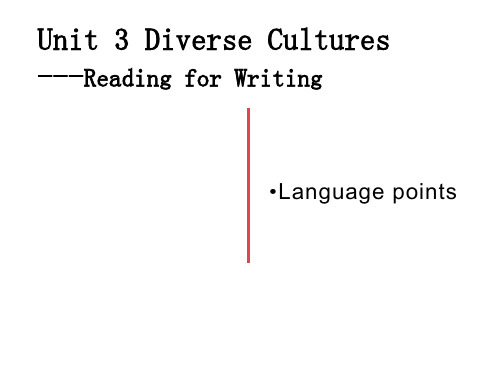
interesting sights, smells, and sounds of China. Portsmouth Square is also a key site,
being the centre of Chinatown. It has a long and famous history, with the author
1). With the problem _s_e_tt_le_d____(settle), he went home happily. 2). The teacher told the students to settle down to _s_tu_d_y_i_n_g_(study) the text. 3). After he _s_e_t_tl_e_d__(settle) down in the city, he wrote her a letter to invite her to visit his new house.
4. Does the city/town introduction contain all the important information?
contain vt. 包含;含有;容纳 contain oneself 控制自己 container n. 容器
① I'm glad to find the book which _c_o_n_ta_i_n_s(contain) all the information Ineed. ②I'm so angry that I couldn't __c_o_n_ta_i_n_m__y_s_e_lf_(控制我自己). 既学既练 ①There are 60 students in our class,_c_o_n__ta_i_n_in_g__(contain) 35 boys and 25boys. ②The _c_o_n_t_a_i_n_e_r__(contain) contains many kinds of fruits, including apples. ③Hearing the news, he couldn”t containh_i_m_s_e_l_f (he) and burst into laugh.
- 1、下载文档前请自行甄别文档内容的完整性,平台不提供额外的编辑、内容补充、找答案等附加服务。
- 2、"仅部分预览"的文档,不可在线预览部分如存在完整性等问题,可反馈申请退款(可完整预览的文档不适用该条件!)。
- 3、如文档侵犯您的权益,请联系客服反馈,我们会尽快为您处理(人工客服工作时间:9:00-18:30)。
Unit 3 Diverse CulturesReading and ThinkingWednesday, 21 June6月21日,星期三Today was my first day back in San Francisco after camping in the Redwood Forest and visiting the wine country of Napa Valley. I have to admit that it definitely feels good to be back in the city again. And what a city—a city that was able to rebuild itself after the earthquake that occurred in 1906. There are so many beautiful old buildings—many siting on top of big hills, offering great views of the city, the ocean, and the Golden Gate Bridge.在红杉林露营并参观了纳帕谷酒乡后,今天是我回到旧金山的第一天。
我得承认,再次回到城里的感觉实在是太棒了。
多么神奇的一座城市啊——一座1906年大地震后重建的城市。
这里有众多美丽的古建筑——不少坐落于大山之巅,城市、大海和金门大桥美景尽收眼底。
My hotel is near downtown, in the Mission District, one of the oldest parts of the city. Many of the people living here are from Mexico or Central America. This district used to be a poor area of town, but is now a centre for art, music, and food. In fact, an art movement called the “Mission School” started here. It’s influenced by graffiti art and comic art. I walked around looking at the street art for a few hours. It was quite modern and lively. Afterwards, I ate some delicious Mexican-Chinese noodles from a food truck. A real mix of cultures here!我住的旅馆靠近市中心,位于教会区,这是旧金山最古老的街区之一。
这里的许多居民来自墨西哥或中美洲。
这个区过去是城里的一个贫困区域,而现在是艺术、音乐和美食中心。
事实上,一场名为“教会派”的艺术运动就发源于此。
这一运动深受涂鸦艺术和漫画艺术的影响。
一连好几个小时,我四处走着,欣赏街头艺术。
这些艺术十分现代,也很生动。
随后,我吃了一份快餐车售卖的美味的墨西哥式中国面。
这真是文化的交融啊!In the afternoon, I headed to a local museum that showed the historical changes in California.I learnt that America got California from Mexico in 1848. In the same year, gold was discovered near San Francisco, which started a gold rush. Over 300,000 people came from all over the world to seek their fortune, and San Francisco quickly became a big city. Many Chinese arrived during this period. To earn a living, some opened up shops and restaurants in Chinatown. Many others found jobs on farms, joined the gold rush, or went to build the railway that joined California to the eastern region of the country. The museum did a really good job of showing how America was built by immigrants from different countries and cultures. When these immigrants left their countries, they carried a bit of home in their hearts, and built a new home here.下午,我前往当地一家博物馆参观,博物馆展示了加利福尼亚的历史变迁。
我了解到,1948年美国从墨西哥手中得到加利福尼亚。
同年,旧金山附近发现黄金,引发了淘金热。
世界各地30多万人蜂拥而至,在这里谋出路,旧金山迅速成为一座大都市。
很多中国人也在这个时期来到此地。
为了谋生,有些人在唐人街开商店、开餐馆。
更多的人则在农场打工、加入淘金大军,或者参与修建加州通往美国东部的铁路。
这家博物馆完美地展示了美国是如何由不同国家和文化的移民建设起来的。
这些移民离开他们的祖国时,心中装着一片故土,最终在这里建立了新家园。
This evening, I went to Chinatown. There were so many cafés and restaurants to choose from. I selected a Cantonese restaurant that served its food on beautiful china plates. What great food!今晚,我去了唐人街。
这里有很多不错的咖啡馆和餐馆可供选择。
我挑了一家粤菜馆,他们端出来的菜肴是放在精美的瓷盘子上的。
太好吃了!That’s enough for today. Tomorrow evening, I’m going to a jazz bar in the Richmond Distinct. Can’t wait!今天就写到这里吧。
明天晚上,我要去里上满区的一家爵士酒吧。
我已经迫不及待了!Reading for WritingWELCOME TO CHINATOWN!唐人街欢迎您!The Chinatown in San Francisco is the biggest in America, and also the oldest. It is a very popular tourist draw that receives more visitors each year than even the Golden Gate Bridge. The climate is mild all year round, meaning it is always a good time to visit.旧金山的唐人街在全美规模最大、历史最为悠久,是一个非常受欢迎的旅游景点,每年接待的游客甚至比金门大桥还多。
这里一年四季气候温和,这意味着任何时候都适宜来游览。
Historically, Chinese immigrants settled in the area during the railroad construction and gold rush period. What started as a residential area for Chinese immigrants then turned into a centre tor Chinese culture. The majority of residents in Chinatown are still ethnic Chinese, many of whom do not speak English fluently. This allows visitors to experience a real taste of China.历史上,在修筑铁路和淘金热时期,来自中国的移民定居于此。
这里原本是中国移民的居住地,后来变成一个中国文化中心。
如今唐人街的绝大多数居民依旧是华人,他们中很多人英语说得并不流利,这能让游客体验到正宗的中国味。
Most of Chinatown was destroyed in the 1906 earthquake, but the city and residents rebuilt it, taking care to include lots of Chinese architecture. Traditionally, visitors enter Chinatown through the legendary Dragon Gate, which was built using materials donated from China. Other famous sites include the Tin How Temple andBank of Canton, to name but a few. Visitors can also spend hours just exploring the interesting sights, smells, and sounds of China. Portsmouth Square is also a key site, being the centre of Chinatown. It has a long and famous history, with the author Robert Louis Stevenson having spent much time writing there. These days, the square is a great place to see traditional Chinese culture in real life, such as games of Chinese chess, and people practising tai chi.唐人街的大部分建筑毁于1906年的大地震,但是市政府和居民将它重建,并且特地融人诸多中国建筑元素。
